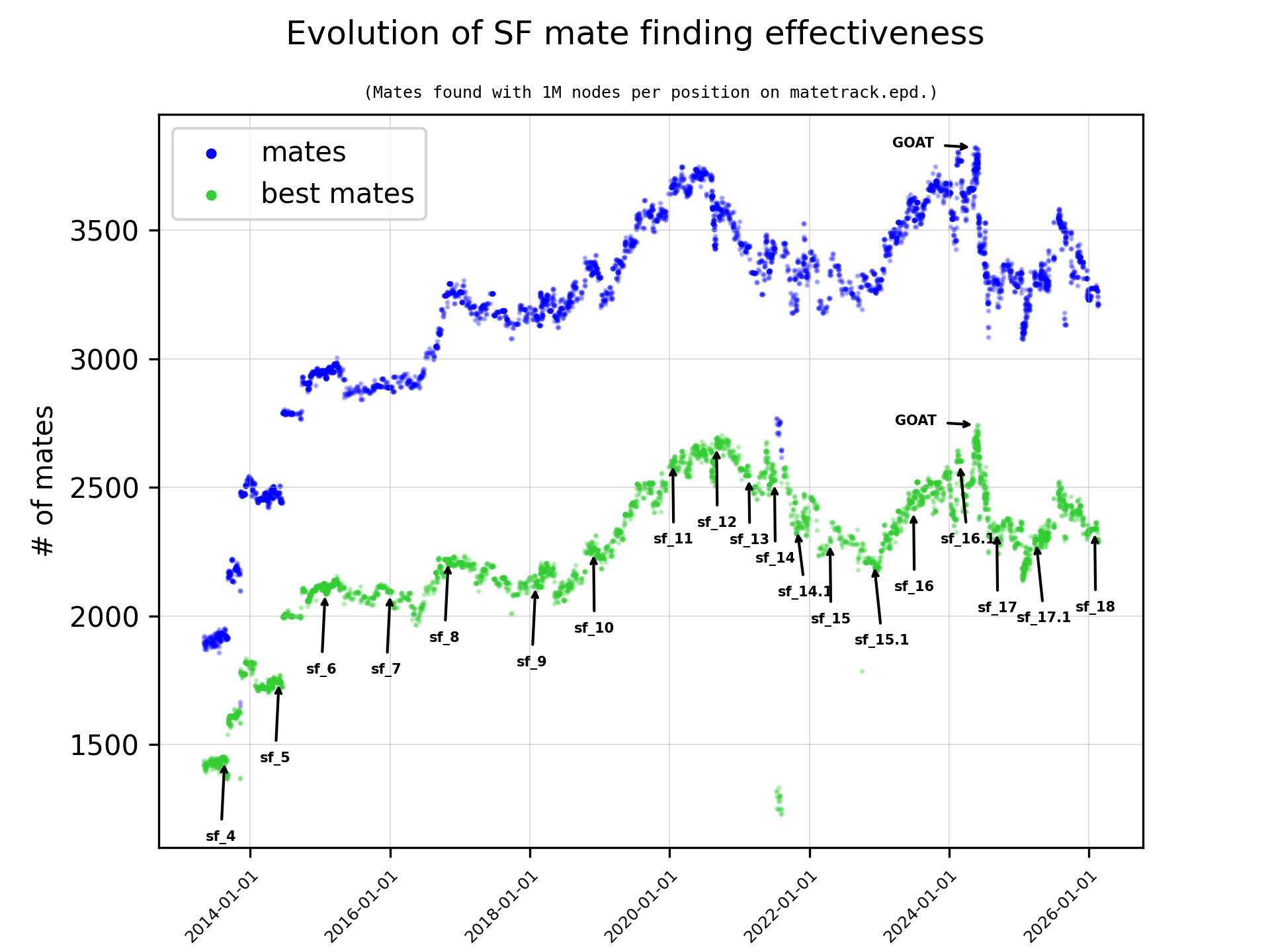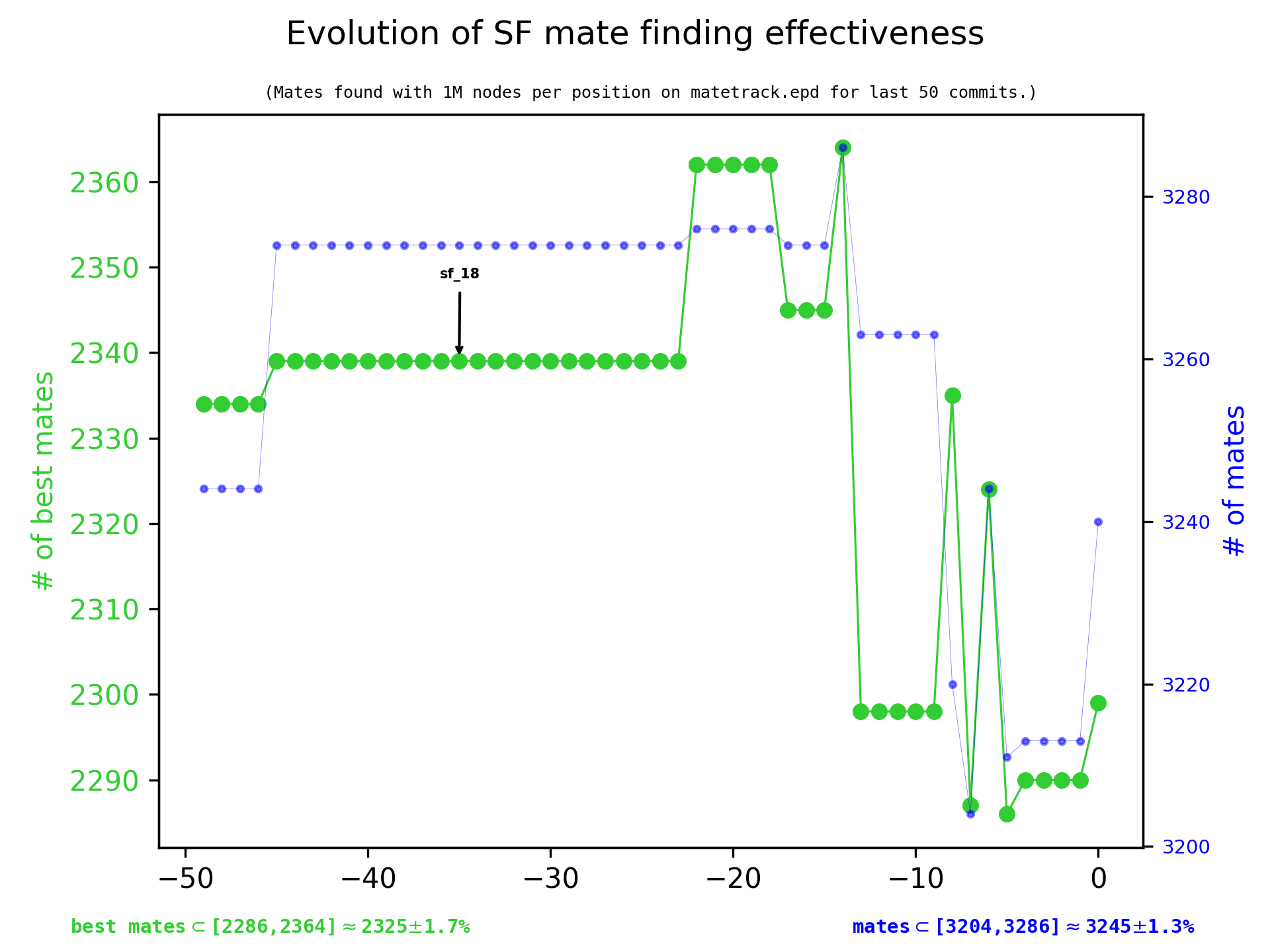Track the performance of official Stockfish
in finding the (best) mates within the 6554 mate problems in matetrack.epd.
The raw data is available in matetrack1000000.csv,
and is visualized in the graphs below.
usage: matecheck.py [-h] [--engine ENGINE] [--nodes NODES] [--depth DEPTH] [--time TIME] [--mate MATE] [--hash HASH] [--threads THREADS] [--syzygyPath SYZYGYPATH] [--minTBscore MINTBSCORE] [--maxTBscore MAXTBSCORE] [--concurrency CONCURRENCY] [--engineOpts ENGINEOPTS] [--epdFile EPDFILE [EPDFILE ...]] [--showAllIssues] [--shortTBPVonly] [--showAllStats] [--bench]
Check how many (best) mates an engine finds in e.g. matetrack.epd, a file with lines of the form "FEN bm #X;".
options:
-h, --help show this help message and exit
--engine ENGINE name of the engine binary (default: ./stockfish)
--nodes NODES nodes limit per position, default: 10**6 without other limits, otherwise None (default: None)
--depth DEPTH depth limit per position (default: None)
--time TIME time limit (in seconds) per position (default: None)
--mate MATE mate limit per position: a value of 0 will use bm #X as the limit, a positive value (in the absence of other limits) means only elegible positions will be analysed (default: None)
--hash HASH hash table size in MB (default: None)
--threads THREADS number of threads per position (values > 1 may lead to non-deterministic results) (default: None)
--syzygyPath SYZYGYPATH
path(s) to syzygy EGTBs, with ':'/';' as separator on Linux/Windows (default: None)
--minTBscore MINTBSCORE
lowest cp score for a TB win (default: 19754)
--maxTBscore MAXTBSCORE
highest cp score for a TB win: if nonzero, it is assumed that (MAXTBSCORE - |score|) is distance in plies to first zeroing move in(to) TB (default: 20000)
--concurrency CONCURRENCY
total number of threads script may use, default: cpu_count() (default: 32)
--engineOpts ENGINEOPTS
json encoded dictionary of generic options, e.g. tuning parameters, to be used to initialize the engine (default: None)
--epdFile EPDFILE [EPDFILE ...]
file(s) containing the positions and their mate scores (default: ['matetrack.epd'])
--showAllIssues show all unique UCI info lines with an issue, by default show for each FEN only the first occurrence of each possible type of issue (default: False)
--shortTBPVonly for TB win scores, only consider short PVs an issue (default: False)
--showAllStats show nodes and depth statistics for best mates found (always True if --mate is supplied) (default: False)
--bench provide cumulative statistics for nodes searched and time used (default: False)
Sample output:
Using ./sf16 on matetrack.epd with --nodes 10000
Engine ID: Stockfish 16
Total FENs: 6554
Found mates: 524
Best mates: 355
Parsing the engine's full UCI output, the following issues were detected:
Bad PVs: 600 (from 351 FENs)
Note that the mate counts are out of the total number of FENs, while the reported issues cover all the UCI output lines received from the engine. Here a "bad" PV may mean that it is too short, too long, allows a draw, contains illegal moves or does not end in checkmate.
ChestUCI_23102018.epd: The original suite derived from publicly availableChestUCI.epdfiles, see FishCooking. It contains 6561 positions, with one definite and five likely draws, some illegal positions and some positions with a sub-optimal or likely incorrect value for the fastest known mate.matetrack.epd: The successor toChestUCI_23102018.epd, with all illegal positions removed and all known errors corrected. The plots shown above are based on this file. It contains 6554 mate problems, ranging from mate in 1 (#1) to #126 for positions with between 4 and 32 pieces. In 26 positions the side to move is going to get mated.matetrackpv.epd: The same asmatetrack.epd, but for each position the file also includes a PV leading to the checkmate, if such a PV is known.matedtrack.epd: Derived frommatetrackpv.epdby applying a best move in all those positions, where the winning side is to move, and where a best move is known. The order of the positions inmatedtrack.epdcorresponds 1:1 to the order inmatetrack.epd. So the new test suite still contains 6554 mate problems, but for 6546 of them the side to move is going to get mated.mates2000.epd: A smaller test suite with 2000 positions ranging from #1 to #27. It contains a random selection of positions frommatetrack.epdandmatedtrack.epdthat Stockfish can solve with 1M nodes. In 1105 positions the side to move is going to get mated.
With the help of the script advancepvs.py it is easy to derive new mate
puzzles from the information stored in matetrackpv.epd. For example, the file matedtrack.epd has been created with the command
python advancepvs.py --plies 1 --mateType won && sed 's/; PV.*/;/' matedtrackpv.epd > matedtrack.epdSimilarly, a file with only #-10 positions can be created with the command
python advancepvs.py --targetMate -10 && grep 'bm #-10;' matedtrackpv.epd > mate-10.epd
